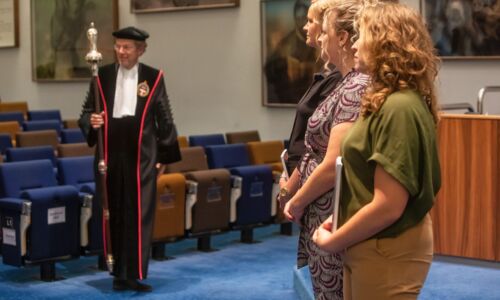How Brexit raises the threshold to Oxford and Cambridge
-
 Oxford. Foto via Pixabay
Oxford. Foto via Pixabay
Universities such as Oxford, Cambridge and London are dream destinations for ambitious Dutch students. The United Kingdom is particularly popular for exchanges or for a Master’s degree. Does Brexit – a fact since 1 January – throw a spanner in the works?
The Erasmus+ programme is symbolic for a Europe without borders. Thanks to the European Union programme, students can go on an international exchange without a lot of extra costs or effort. The United Kingdom is the most popular destination among Nijmegen students. In the academic year 2019/2020 just over a hundred students from Radboud University with the programme went to the other side of the Channel for an internship or as part of their study. The previous year the figure was more than 150. In the current academic year exchanges are not possible due to the coronavirus crisis.
It was unclear whether the United Kingdom would leave the Erasmus+ programme for a long time. When a Brexit deal was reached in December, it turned out that it would. Are exchanges now completely out of the question?
No, agreements have been made that European students can go on an exchange to a British university until May 2023. And vice versa. Elco van Noort, senior policy advisor internationalisation at Radboud University, hopes that there will still be opportunities for exchanges after this. ‘Separate agreements will have to be made with British universities for this. For example, the universities of Oxford and Glasgow are important partners of ours. We could discuss with them that exchange students or students for a joint programme don’t have to pay tuition fees or pay a reduced amount.’
So as soon as the coronavirus is under control there won’t be anything to prevent Nijmegen students going on an exchange to the land renowned for its pubs, football and fish and chips?
It will involve slightly more red tape. If students want to stay longer than six months, they may have to apply for a visa. Also, according to Van Noort, it is still uncertain whether the European Health Insurance Card (EHIC) will still be valid. This means that students will have to take out insurance to cover medical care in the United Kingdom.
And what does Brexit mean for Dutch students who want to follow a full Bachelor’s or Master’s degree in the United Kingdom?
They will have to pay a lot more. Previously they paid the same tuition fees as British students: about 9,000 pounds per year. Now students from the EU will have to pay the overseas rate that is at least three times this amount. For example, a year at Oxford costs between 27,000 and 38,000 pounds. There are scholarships available for outstanding students, but this is a minority. ‘It may well be the case that studying in the United Kingdom will become more elitist, just like studying in the United States is now’, says Van Noort.
What does Brexit mean for British students who want to come to Nijmegen?
They will have to pay more too. The following applies within the European Union: domestic students pay the same tuition fees as students from another EU country. Now that the United Kingdom is no longer part of the EU, from the next academic year on British students in the Netherlands will have to pay between 11,500 and 14,500 euros per year. But British students who are already enrolled on a multi-year programme will continue to pay the standard rate (just over 2,000 euros). And there aren’t many of these: there are currently fifteen British students enrolled in a normal Radboud programme. It is more often the case that British students go on an exchange to Nijmegen – this figure fluctuated around a hundred in the years before the corona crisis.
And another thing: a survey among EU students shows that the Netherlands can expect more international students as the result of Brexit. Why is this?
According to the survey results, many European students who really wanted to go to the United Kingdom to study are now considering choosing another destination. They see the Netherlands as a good second choice. Van Noort is already anticipating an increasing international influx. ‘We are an attractive alternative because of the good English-language education we offer.’
On this page the International Office summarises all the important information about a stay in the United Kingdom.



